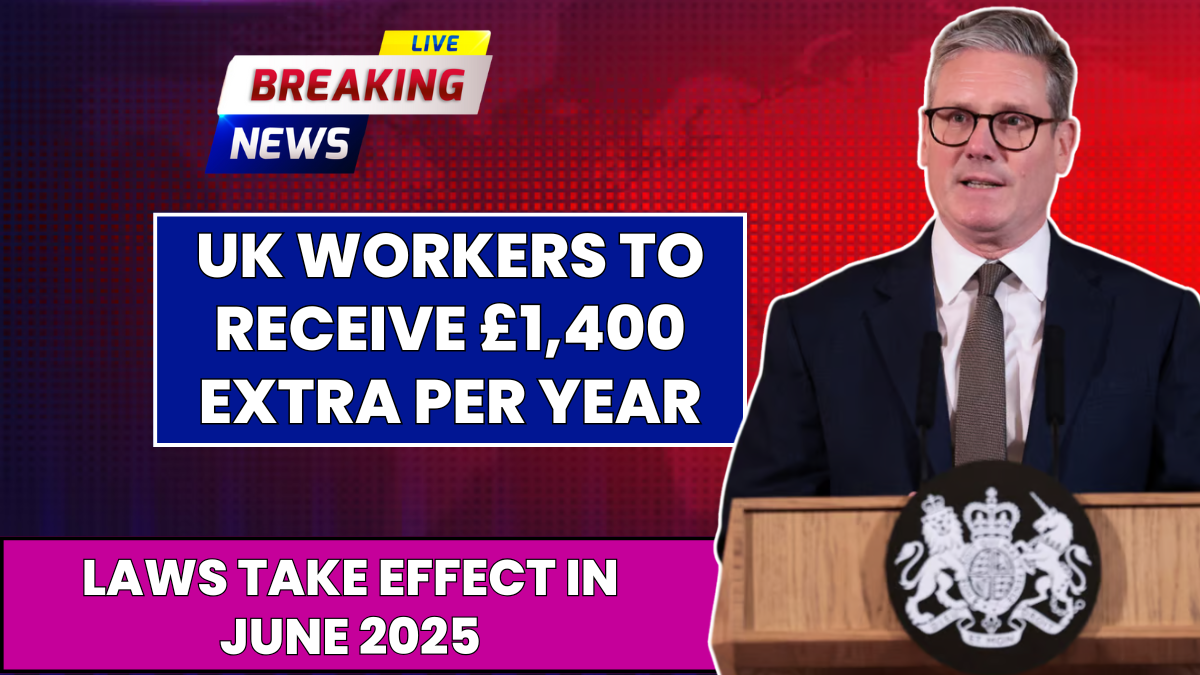Many major changes UK Workers are going to be implemented in the United Kingdom from June 2025, which will directly affect millions of employees and employers of the country. These changes mainly include salary hikes, improvements in sick and family leave payments, new minimum wage rates, changes in National Insurance contributions and new leave rights for parents of newborn children.
These reforms have been announced by UK Chancellor Rachel Reeves in her first budget. The government says that the purpose of these changes is to make working families financially strong and to give workers their due rights. Let’s know about these new rules in easy and detailed way:
1. More than 3 million employees will get salary hike

The biggest change is the increase in National Living Wage and National Minimum Wage. More than 3 million people will directly benefit from this change.
The National Living Wage will be increased from £11.44 per hour to £12.21 per hour from June 2025. This is an increase of 6.7%. If a person works full time throughout the year, he will get about £1400 more salary annually.
The minimum wage for employees aged 18 to 20 will be increased from £8.60 to £10.00 per hour. This is the biggest increase so far for this age group.
Apprentices have also got relief. Their minimum wage has been increased from £6.40 to £7.55 per hour. The government has also indicated that instead of setting wages according to different ages in the future, there is a plan to apply the same pay rate for all adults.
Chancellor Reeves said, “We promise that every hard worker will get their real wages and this change is a big step in that direction.”
2. Higher payment on family and sick leave Keeping inflation in mind,
the government has also increased the payment of maternity, paternity, adoption, bereavement leave and shared parental leave. All these rates have been increased from £184.03 per week to £187.18 per week. Along with this, your minimum earning limit to get these paid leaves has also been increased from £123 to £125 per week. Apart from this, Statutory Sick Pay has also increased to £118.75 per week, which was previously £116.75.
3. Employers will have to pay more National
Insurance Now let’s talk about the impact on employers. From June, employers will now have to pay 15% National Insurance on employees’ salaries instead of 13.8%.
Also, the minimum annual salary at which this contribution has to be made has been reduced from £9,100 to £5,000. This means that more companies will now have to make this contribution.
But the government has also given relief to small businesses. Employment Allowance has been increased from £5,000 to £10,500. This will prevent about 8.65 lakh small employers from paying NIC and there will be no additional burden on about one million businesses.
4. New leave facility for parents of newborn sick or premature babies
From June 6, 2025, if an employee’s child is born prematurely or the child is seriously ill and the newborn is admitted to the ICU, they will now get Paid Neonatal Leave.
Under this scheme, the mother or father will get one week of paid leave per year according to the duration of the child’s hospitalization, up to a maximum of 12 weeks.
This leave will be applicable from the first day, meaning it will not matter how many days you have been in the job.
This leave will be in addition to maternity or paternity leave. This step is a big relief for those families who go through a very stressful and financially difficult time after the birth of a child.
5. Changes coming ahead – September 2025 and 2026

The changes that are being implemented in June are big, but more improvements will be seen in the coming time:
From September 2025, working parents will get free child care for up to 30 hours per week for children above 9 months of age. This facility will continue till the child starts going to school. For this, the annual income of the parents should be between £9,518 to ¡100,000.
- Changes will be made in the Employment Rights Bill in 2026. Under this:
- The minimum earning requirement for getting sick leave will be abolished.
- The first three “waiting days” in which salary is not received till now will also be removed.
Conclusion
It is clear from all these changes that the government now wants to give higher wages, better social security and more flexibility to working people. Employees should be aware of their rights and employers should also update their systems according to these changes in time.
If you are an employee, you can increase your income by taking advantage of these changes and if you are an employer, you will have to plan your expenses again. These changes point to a new direction where working people will get more respect and security.
FAQs
1. What is the new £1,400 payment for UK workers?
The £1,400 extra per year is a result of updated employment laws coming into effect in June 2025, aimed at improving worker income and protections.
2. Who is eligible for the £1,400 annual increase?
Most full-time workers in the UK under standard employment contracts will benefit. Eligibility depends on income level, job type, and contract terms.
3. When will the new employment law changes be implemented?
The new employment laws are scheduled to take effect from June 2025.
4. Will part-time or gig workers receive the £1,400 increase too?
Part-time workers may receive a proportional amount depending on hours worked. Gig workers’ inclusion depends on how their employment status is classified under the new rules.
5. Is this payment tax-free?
No, the £1,400 will be counted as part of your gross income and subject to regular tax and National Insurance deductions.


